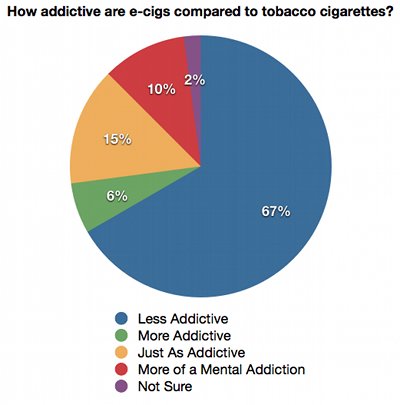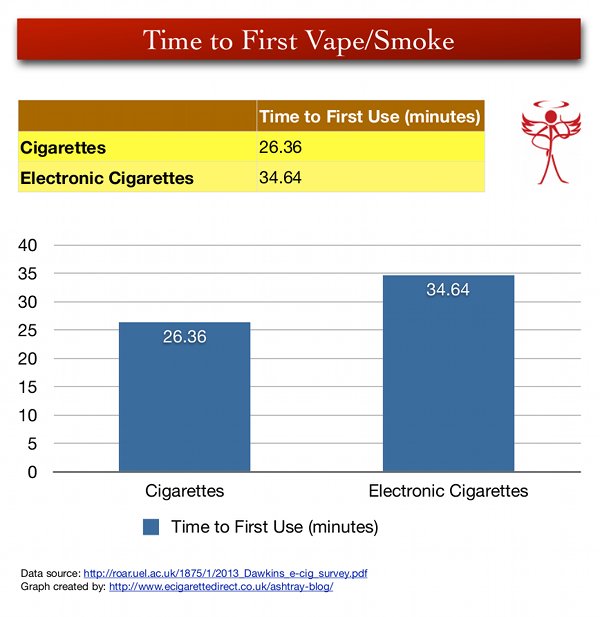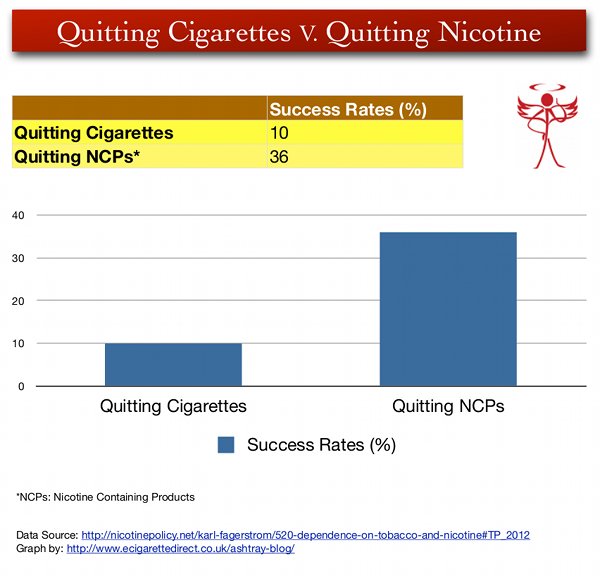Why Everything They Told You About Nicotine
Addiction MayBe Wrong…
by: James Dunworth
And just how addictive is nicotine when removed from tobacco?
according to respected sources there’s something much harder to quit than heroin
Nicotine.

(After reading this, I made a point of discussing the claim with an ex-heroin addict. He had some interesting thoughts, which I’ll share with you later in the post.)
But for now, it’s worth noting that many e-cigarette users believe that ecigarettes are less addictive than tobacco cigarettes.
Here are the results of a poll I ran back in 2011:

(Full results can be found here.)
I decided to test this myself by sending myself on a five day holiday to the Mediterranean - leaving my electronic cigarette behind!
Intriguingly, when I had no e-cigarette to hand, I felt no more than an occassional, quick-to-pass mild irritation.
You’ll probably agree with me that neither of the above provide sufficient evidence that electronic cigarettes are less addictive than smoking.
(In fact, I plan to repeat the holiday experiment to make sure the results weren’t a one-off.)
But it does make me wonder:
- Is it just the nicotine in tobacco cigarettes that makes cigarettes addictive?
- And just how addictive is nicotine anyway?
Fortunately, new studies and evidence are starting to suggest some answers.
Scientists are also starting to investigate nicotine addiction, with one researcher arguing:“There is very little to no evidence for the abuse of nicotine when not delivered in a tobacco vehicle.”
Source: Nicotine Policy | Click To Tweet This Quote
Evidence That Nicotine Is Not As Addictive as Smoking

With a little help from my friends, I found it easy to resist the urge to vape.
Cravings Not As Strong and Time to First Vape Longer

Intriguingly, when vapers were asked to compare E-cigarette cravings to cravings for tobacco cigarettes, only 18% believed they were as strong. This is backed up by a 2013 study by Dr Farsalinos which found that users rated ecigarettes as less addictive than tobacco cigarettes.
The same researchers have found that electronic cigarettes wait longer before having their first vape as compared to cigarette smokers (see graph above).
Source: Dawkins et al and La Press
Easier to Quit Pure Nicotine Than Nicotine in Tobacco

The success rates for quitting cigarettes is dire. (Indeed, one study found that quit smoking attempts were as low as 0.8 with pharmaceutical manufactured cessation aids).
However, the quit rate for other nicotine users is much more successful.
A study by Tonneson and Mikkelson of 69 long term users of nicotine containing products found a cessation rate of 36%. Karl Fagerstrom compared that to a success rate of quitting tobacco of 10% (as measured at 12 weeks).
However, the data needs to be treated with some caution, because:
- this was a small study of just 69 users
- success was measured at just 12 weeks (we know that many quitters revert to smoking after 12 weeks)
Source: Fargestrom 2013
Success rates with ecigarettes do seem to back the data up – for example another small study by Professor Polosa found that over 50% of smokers given ecigs managed to stop or reduce nicotine usage in a three month period. (Polosa discussed the results with us here.)
Lab Tests on Nicotine Addiction With Rats

The addictive properties of nicotine have not been tested on people in a lab system. But tests have been conducted on animals.
The results showed:
- animals are more likely to administer other dependence provoking drugs such as such as amphetamine, coca1ne, and heroin
- rats respond better to nicotine with other tobacco ingredients than to pure nicotine* (see below for more detail)
Possible Causes
Is nicotine the only addictive substance in tobacco?
I’ve seen claims that other elements of tobacco can cause addiction, but only recently from a scientist.
Konstantinos Farsalinos recently told us that there may be several other chemicals in tobacco, such as alkaloids, alkanes and monoamine oxidase inhibitors, which make cigarettes more addictive.
Indeed, a 2009 study by Clemens et al, found rats wanted nicotine more when nicotine was combined with the following alkaloids from tobacco:
- anabasine
- anatabine
- cotinine
- myosmine
- nornicotine
This evidence suggests that ecigarettes, which do NOT contain these alkaloids, are likely to be less addictive than cigarettes.
It’s also worth noting that cigarettes have more than 5 alkaloids, and it’s entirely possible that other alkaloids make tobacco smoke even more addictive.
Source: Clemens et al
Difference in Flavours

In contrast to cigarettes, eliquids currently come in a wide range of flavours.
This is not something I personally agree with, but Dr Polosa told me that the flavour of ecigarettes may have something to do with them being less addictive:Tobacco companies have accumulated a big deal of expertise in crafting palatable tobacco aromas over the years and they know far too well that a good product requires the right balance of several ingredients…
Source: Five Scientists Present the Case for ECigarettes
However, in contrast to a limited number of tobacco flavours in ecigarettes, there is a huge range of eliquid flavours.
What’s more, many vapers eventually switch to non-tobacco flavours like blueberry and bubblegum, flavours they can’t get in cigarettes. So that’s not an argument I buy!
Electronic Cigarettes Deliver Less Nicotine Than Cigarettes
Another reason that you may find your ecigarette is less addictive than smoking is that ecigs deliver less nicotine than tobacco cigarettes.
In fact in one study, Bullen et al found that a 16 mg electronic cigarette only delivered 40% of that quantity of nicotine. (That’s something that experience bears out, and I usually recommend that new e-cigarette users go one strength above what they use in tobacco cigarettes.)
Source: Bullen quoted on ECigarette Research
Chris Price of ECigarette Politics agrees with, pointing out that professional chemists on ECigaretteForum estimate that only about 50% of the nicotine in eliquid is actually contained in ecigarette vapour.
Should E-Cigarettes Be More Addictive?

Now, if you are an e-cigarette user you might be rejoicing, especially considering the often-made but unproven claim that ecigarettes are more addictive than cigarettes.
But Dr J F Etter believes that ecigarettes need to be more addictive in order to get more smokers off cigarettes.
And in our 2014 predictions post, he argued that the first manufacturer to produce an ecigarette that would deliver nicotine faster to the brain would take the market.
What do you think?
Thoughts from An Ex-Heroin Addict
I mentioned earlier I spoke to a friend who is an ex-heroin addict and a smoker. He told me:The argument that nicotine is more addictive than heroin is complete bullshit. People say that because nicotine is always in your face and it’s readily available, but heroin withdrawal has a whole physical aspect to it which doesn’t exist with nicotine.
The hallucination aspect of the Trainspotting may be an exaggeration, but if anything the withdrawal symptons are a lot worse than shown in the video because they last longer, include cold sweats and can be physically painful.
Read on!
How Much Eliquid Would It Take to Kill You? Essential Information For All Vapers
Nicotine in Electronic Cigarettes: 10 Facts All Users Need to Know
An Interview with Nicotine Expert Dr Jacques Houezeq
* Nicotine with alkaloids, which represents tobacco smoke, was much more likely to be self administered in comparison to nicotine without alkaloids, which would more closely represent Ecigarette vapour.
- See more at: http://www.ecigarettedirect.co.uk/as....Ci5wTnwz.dpuf



















Social Networking Bookmarks